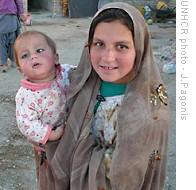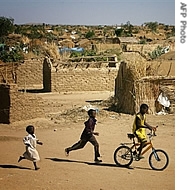VOA标准英语2008年-Conflicts in Iraq, Afghanistan Drive Up World R(在线收听)
By Sonja Pace
London
17 June 2008
The U.N. refugee agency says the number of people fleeing violence and repression worldwide has risen to 11.4 million, largely due to the conflicts in Iraq and Afghanistan. VOA's Sonja Pace reports from London on UNHCR's status report for 2007.
 |
| An Afghan girl carries her infant sibling in Iran's Sistan Baluchistan province |
Launching the report, the U.N. High Commissioner for Refugees, Antonio Guterres, said that for the second year in a row the number of people fleeing their countries and displaced from their homes is on the rise.
"We have today 11.4 million refugees worldwide, but we have 26 million people displaced within the borders of their own countries," he said.
Guterres says conflicts are largely to blame. Refugees from Iraq and Afghanistan alone make up half the world's total. The 11.4 million tally does not include the millions of Palestinians living as refugees in the Middle East and elsewhere in the world.
Guterres describes a band of conflict and instability that includes mostly Muslim countries.
"Now, together with the Palestinians more than half of the group of refugees are concentrated in the same area," he said. "That area starts in Afghanistan, it includes Iraq, Palestine, Sudan, Chad and Somalia. And this is an area of great concern for us all and I can only ask the international community to be more and more involved together, acting together to make sure that these conflicts find an end."
 |
| Darfurian refugees chidren play in the Sudanese refugees camp run by the NGO 'Eastern Chad' in Gaga, near the border with Darfur (File) |
While Afghanistan, Iraq and the Darfur region of Sudan are highly publicized hotspots, UNHCR's Guterres says many other refugees are created by lesser known conflicts and hardships - often forgotten by the international community.
"And looking only at one continent Africa, we have been having since the beginning of the year, with people crossing their borders in big numbers, in thousands we are having new arrivals of Darfurians in Chad and Central African Republic, of Chadians in Cameroon, of Central African Republicans in Chad and in Cameroon, of Eritreans in Sudan and in Ethiopia, of Somalis in Yemen, in Kenya, in Djibouti, we have Kenyans crossing the border into Uganda and we are now witnessing the worsening situation in Zimbabwe," he said. "Now, this demonstrates a trend that represents a multiplication of crises, with more and more people on the move."
The U.N. agency says global refugee numbers had fallen for five years before rising again in 2006 and 2007. While conflicts are largely to blame, UNHCR says climate change, the rise in energy and food prices and ensuing poverty are also factors.